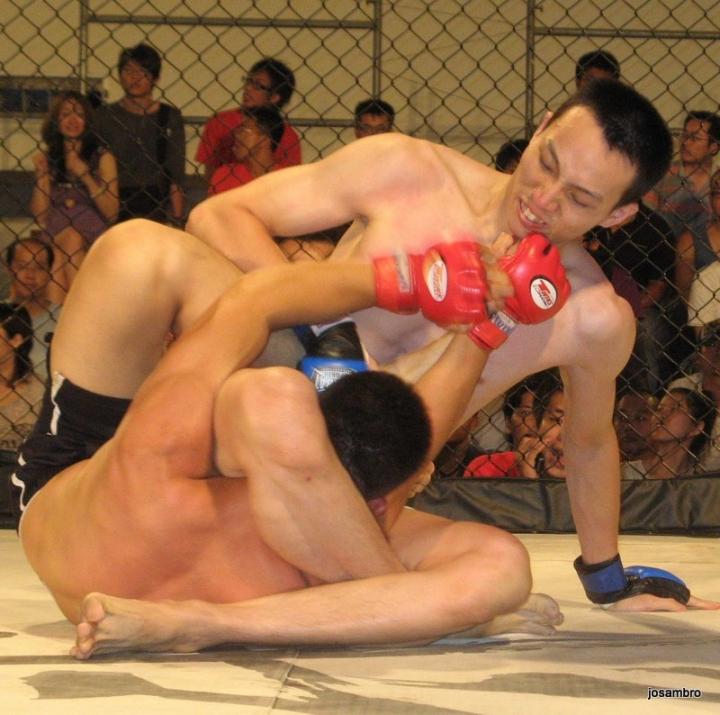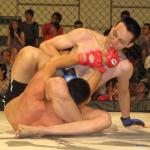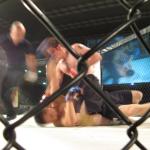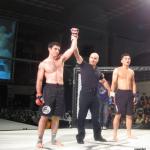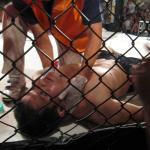Grace versus Brute Force: MMA in Taiwan
It's five in the afternoon at Hsinchu's Municipal Stadium.
Inside, a crowd of about twelve hundred have gathered, their vibe rowdy, but polite: This is, after all, still Taiwan. Heavy Metal music blares over loudspeakers, and around the still-empty battle octagon, anticipation mingles with dry-ice fog. Outside of the stadium doors an ambulance sits waiting. “Just in case,” says an event organizer. Welcome to the world of MMA - Mixed Martial Arts.
The concept of MMA is simple: Fighters trained in different schools and styles compete. They are matched up roughly by height and weight, but this is generally where their similarities end. A typical MMA match might see a Kung Fu fighter going toe-to-toe with a wrestler, a judoka may be pitted against a boxer, or a jujitsu master might find himself facing a straight-up barroom brawler.
Grace versus brute force. Strikers fighting grapplers. Pit bulls against alligators.
The first round pits two roughly-evenly matched strikers against one another. It ends before I can get any meaningful notes.
The second round begins similarly, with both fighters trading blows and displaying beautiful striking form. However, it's clear that one of the fighters, a Taiwanese with blue gloves and buck teeth, is more interested in grappling than striking. In short order, he drags his opponent down gets him in a classic triangle hold with his legs. Pulling him tighter and tighter, the grappler looks like a python taking its time with its prey - and the conclusion is foregone by the one minute mark. Hold broken by the bell, the two men embrace like long lost brothers - a beautiful moment in man-to-man combat.
The crowd is getting more worked up as the third round opponents come out, the first match pitting a local fighter against a western import. Lin, a freestyle Kung fu fighter looks nervous early on but still draws first blood from his opponent, James, an American whose listed skills include Brazilian jujitsu and some sort of Muy Thai hybrid. But Lin is a striker, clearly unprepared for James' plan B, which entails pulling his opponent to the ground and quickly pummelling him into submission.
“These kung fu guys get wiped out,” Paulo, an NYC native working in Hsinchu says to me as James is declared the winner. “Kung fu is a soft art.”
I agree with him. The other guy didn't have the eye of the tiger.
It's in the next round that the meaning of "just in case" becomes clear. Victor is a Canadian specializing in Taikwondo and freestyle fighting, and his opponent is a shorter, thicker kick boxer with massive legs.
“Look at those legs,” Says Paulo. “The Canadian is going to go for the legs first.”
Paulo's words are frighteningly prescient, as Victor comes out after the bell and, using his longer reach, begins systematically chopping his opponent's legs as if they were wood. Both men are strikers, but deprived of his legs the Taiwanese kick boxer is powerless. Victor lunges with a devastating punch to the head, dropping his opponent like a dead tree. For a full three minutes the crowd buzzes with nervous excitement as the smaller fighter stays down, eyes staring blankly at the ceiling high above. It is an ugly end to a brutal match, and a collective sigh of relief is breathed when the smaller fighter stands. He leaves the ring beaten, and possibly concussive, but vertically - proving the maxim that any fight you can walk away from is a good one.
The event goes into intermission. A good excuse for the drinkers in the audience to sneak more beer (Verboten in the stadium, being city property) and for me to get a few photos of the event's beautiful and scantily-clad ring girls.
The fifth match - the first after the break - is a quick one. Wu and Cheng seem equally matched, being roughly the same size and practitioners in disciplines involving both striking and grappling. But again, it boils down to that elusive psychological aspect. The look on Wu's face tells the story. He seems nervous. His opponent, red-gloved Cheng, seems not merely confident but angry. Wu gets in a few strikes, but these are matched by Cheng who quickly takes him to the mat. Wu struggles, striking in so far as he is able, but as Cheng holds him firm from behind Wu's blows fail to land with any meaning. After less than thirty seconds of ground struggle, Wu strikes his final blow, not on Cheng but to the ground, the internationally accepted cry of “Uncle!” The sound of air filling Wu's lungs competes with the roar of the crowd.
The next match is between a French mixed martial artist / Judoka and a Taiwanese striker. It is a round completely devoid of foreplay as the Frenchman gets down to business quickly. Any dubiousness I feel about the applications of Judo in a mixed match ring are quickly dispelled. Within the first five seconds the Frenchman has his opponent in a choke hold, and the striker can get neither leverage to break the hold nor opportunity to punch his way out. Before a minute has passed, the striker is pinned, and the Frenchman declared the winner.
The seventh round is a painful mismatch. Sammy is a South African with the build, swagger and paunch of a barroom brawler. His fighting style, according to several ringside friends who know him, is simply "South African." His opponent, Wu, while of the same weight class, is close to a twelve centimeters shorter and in reach. To make matters even stranger, Wu comes out wearing a cheaply made cloth gladiator costume. “Is this some sort of a psyche out,” I wonder. “What sort of a fighter comes out against a monster dressed like a Chinese court jester?”
Remembering the words of Sun Tzu advising the strong to appear weak, I begin to entertain the idea that this might indeed be a psychological ploy. This is swiftly dispelled at the fourteen second mark. Sammy's first blow, a knee to the face (or, as they say in the back streets of Cape Town, "n Snotklap teen die kop") knocks Wu unconscious.
The South African giant is graceful in victory. “It seems we have a little extra time here,” he begins, before launching into a good-natured soliloquy that ends with an invitation for the audience to join him in a post-brawl barbeque.
It's during the last fight that the beauty, majesty, and brutality of MMA truly comes to life. Wu Dongxing is a Taiwanese brawler, a specialist in a kind of striking and kicking art known as Sanda. Weighing in at 105 kilos and 175 cm, Wu's build could charitably be described as portly. His opponent, American-born Pete, though ten kilos lighter, is also a head taller. A student of Brazilian Jujitsu at a respected Filippino Martial arts academy, Pete (who begins the match with humility, kneeling in prayer in the center of the ring) seems to outclass his heavy opponent.
This final match, and with it the event, seems poised to end quickly. Faster, more agile, and with more moves than Wu, Pete circles his opponent like a shark, every now and then lunging in for a blow. The fat man absorbs most of these, seemingly unconcorned with even rudiments like blocking. Whereas Pete is dancing, using footwork, Wu just stands there, rooted to one spot. Until, that is, the western fighter gets in close.
There is a heavy thud, like the sound made by a truck hitting a cow. Wu's sledgehammer of a foot connects with his opponent's midsection. As Pete grimaces in pain, wu stands still, his posture saying come closer, have another.
Pete, chastened, dances more carefully around Wu, carefully aiming blows of varying style and intensity to his heavy opponent's face, head, and body. Wu absorbs them all, not seeming to react to any in particular. But collectively, they are taking their toll, and the blows, along with the effort of moving his own weight around the ring, seem to portend the end is near.
Or is it? Wu is striking slowly now, with neither charm nor grace, landing only one blow in three. But each that lands seems to make Pete a little more careful, a little more reluctant to move in for the kill.
A punch is thrown, and caught, and soon the pair are on the ground. Wu is on his back, and at first glance it looks like the heavier fighter is being pinned. Only when I move closer do I see that Wu has Pete in a vicious chokehold, pulling the back of the taller fighter's head into his fat stomach, growling like a wounded bear.
The American is in agony, his neck twisted backwards. He must be running out of air. He lashes out at the only target available, the sides of the fat fighter's stomach. The clench is held for over a minute, the taller fighter trying desperately to break his opponent's grip, managing eventually to do so with his left arm.
Wu is still on the ground. Pete is winded. Both stand up and assess the damage slowly.
More ring work. Wu launches himself head first like a cannonball into Pete's midsection, smacking him back into the octagon gate. The ground shakes. Both men are breathing hard. The bell rings, and for the first time tonight a match goes into round two. Wu leans into the gate as his friends try to staunch the bleeding from a cut above his eye. Across the octagon, Pete may be wondering about the efficacy of his pre-match prayers.
The bell rings again, and the fighters come out for round two. Both are exhausted, bloody and battered. Both seem chastened, as if they'd underestimated their opponents. Wu is still breathing hard, and Pete dances around him, launching fist after fist into Wu's face with horrifying cracking sounds. Wu is bleeding from both nostrils now, and Pete is grimacing as well. His body language suggests that the cracking sound just heard was that of his own fist breaking on Wu's nose. Wu tries to launch a roundhouse kick but, exhausted and slow, fails to connect. Pete, knowing another kick might be his last, has no intention of getting that close. He continues dancing.
The end comes without drama. Wu, eyes nearly swollen shut, backs into one end of the Octagon while his opponent remains at a distance. The referee calls a quick pause to inspect Wu's badly damaged face; whether it's the fighter or the ref who makes the call is unclear, but the determination is made that Wu should not be allowed to continue. The crowd screams as Pete is declared the winner. Bleeding but unbowed, the portly Wu exits the octagon with his entourage.
Somewhere in my head, I hear the nasal, ghostly voice of legendary sportscaster Howard Cosell:
A brutal end to a brutal match in a brutal sport; Not since Santa spent Christmas delivering presents during the great reindeer strike of '57 has a fat man tried so valiantly to beat the odds. And for that, you just have to give him credit.
(More photos at http://picasaweb.google.com/josambro/Fight#.
Special Thanks to Tobie Openshaw for suggesting the phrase "n Snotklap teen die kop")
 ThingsAsian
ThingsAsian